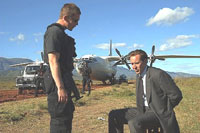Food. Water. Shelter. These are the basic human needs most people can agree upon. Yuri Orlov would add one more—bullets.
“There are 555 million firearms in worldwide circulation, one for every 12 people,” says the erstwhile arms dealer (played by Nicolas Cage) in the opening moments of Lord of War. “The only question is, how do we arm the other 11?”
Writer/director Andrew Niccol (The Truman Show, Gattaca) based Yuri on five real-life gunrunners, and his movie is a primer on the global arms trade for the MTV-influenced masses—a hip soundtrack, a jaded anti-hero, and a look at armed conflict worldwide that you don’t normally get on the nighttime news.
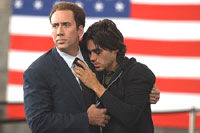
Spanning decades, it starts in the ’80s in Little Odessa, an enclave for Ukrainian immigrants in Brooklyn. Yuri’s family—his parents and a younger brother, Vitaly (Jared Leto)—operates a small restaurant, but he wants something bigger. A close brush with death during a mafia shootout gives Yuri his inspiration—guns. There’s always a market for guns.
He goes from his first local sale (“The first time you sell a gun is like the first time you have sex. You have no idea what you’re doing, but one way or another, it’s over too fast”) to a global player in Hollywood, but it’s on the international stage that the story kicks into high gear. With Vitaly at his side, Yuri travels the world providing everything from guns to tanks to attack helicopters to the world’s dictators, drug lords, and rebel leaders. The post-Soviet Ukraine provides most of his goods—and most of those of his competitors. Between 1982 and 1992 over $32 billion in arms were stolen from the Ukraine.) But perhaps more shocking is the movie’s contention that when the U.S. government engages in conflict overseas, it often leaves those arms in the country after the troops pull out. It costs more than they’re worth to ship the guns back home. Slipping money to a few well-connected military officials buys Yuri the US artillery.
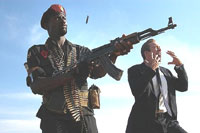
The havoc wreaked by Yuri’s wares always stays just outside the camera’s view and reflects Yuri’s conscious decision not to accept responsibility for the ultimate application of his goods. The camera averts its eyes, much the same way Yuri does. As the narrator, he informs the audience that mankind is violent and there will always be fighting. This isn’t his fault, and the way he sees it, there’s nothing wrong with making a buck off this reality that is much larger than his own participation. If he’s not selling guns, someone else will, so why not be the one to make the money?
Vitaly’s conscience is not so brazen, and he soon succumbs to a drug addiction in what seems to be an attempt to escape his brother’s world. That world includes a wife he deceives at every turn, a son he rarely sees, and Jack Valentine (Ethan Hawke), an Interpol agent hot on his tail.
Lord of War has a surreal edge, despite being enmeshed in world events, with absurdity and dark humor laced throughout. Yuri walks by a woman laying bricks by hand on his way to a business meeting where he will sell mortars that are likely to destroy her work. Women clad in camouflage lingerie prance on the top of tanks at an artillery show, selling the machinery of war like one might sell a sports car. When Yuri is shot in the stomach point blank by a customer (violating his own maxim, “First rule of gunrunning: never get shot with your own merchandise”), he doubles over, but survives unscathed.
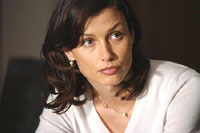
In all of his dealings, Yuri remains staunchly apolitical (unlike at least one of his competitors who uses his sales to influence geo-politics). He never sold weapons to Osama bin Laden, not on principle, but because his checks tended to bounce. Indeed, Yuri has no qualms selling to those who will turn around and kill Americans—or the villagers camped nearby, for that matter.
Since Yuri is the narrator, his own corruption isn’t overtly deplored in Lord of War. And the movie does walk a fine line between humanizing Yuri and making him more hero than antihero. I was reminded of John Travolta’s turn as Vincent Vega in Pulp Fiction. He was one cool cat. Oh yeah, and a killer. But the lack of editorial interpretation of Yuri’s action allows room for consideration of his posits about the depravity of man as well as analyzing Yuri’s own ability to perceive reality and assign value.
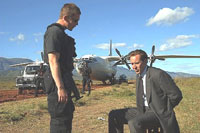
The public policy implications for Lord of War are just as thought provoking. Yuri is untouchable because, frankly, the U.S. government needs him to do their dirty work when it wants weapons in the hands of those it can’t sell to for political reasons. As the movie points out, the five biggest arms dealers in the world are China, France, the United States, Russia, and the United Kingdom—the five permanent members of the UN Security Council. Compared to them, Yuri is small potatoes.
“They say evil prevails when good men fail to act. They should say ‘evil prevails,'” says Yuri when the violence he treads around so blithely finally hits home. That, in essence, is the crux of the dilemma raised by Lord of War. To those operating outside a redemptive religious framework that values ideas like forgiveness, kindness, and justice, on what basis do you argue for laying down arms? What in humanity’s long history of warfare makes one think it’s something we’re even capable of? It’s these kinds of realities and questions that make Lord of War feel very much like a modern paraphrase of Ecclesiastes. Indeed, our guns might be more efficient, but when it comes to violence and warfare, there is truly nothing new under the sun.
Talk About It
Discussion starters- What lies does Yuri tells himself about his work?
- As an Interpol agent, Jack Valentine refused to break the law in order to put Yuri out of business. Given what you know about the political situation by the end of the movie, do you agree or disagree with Valetine’s decision? If you had Yuri out in the middle of Africa, would you let him go?
- Vitaly tells his brother, “Maybe doing nothing is better than doing this”—and then he proceeds to do nothing. Why do you think Vitaly agreed to go with Yuri on another trip, and then to “ruin” the deal? What do you think was the fundamental difference in the way the two brothers perceived the world?
- “They say evil prevails when good men fail to act. They should say ‘evil prevails,'” says Yuri. Do you agree with this statement? If so, to what extent? As a Christian, what gives you hope? See Romans 15:7-13, Hebrews 6:13ff, and Galatians 5:1-5
The Family Corner
For parents to considerwhile the violence is relatively muted, Lord of War is visually disturbing on a number of levels and it does glancingly include executions by gun and machete. This is not a movie for children or young teens. There is also some nudity, including a shower scene between a husband and wife shot from a distance, the backsides of a number of prostitutes, and exposed breasts. Drug use takes place, though it’s never put in a positive light. And there is cursing.
Photos © Copyright Lions Gate Films
Copyright © 2005 Christianity Today. Click for reprint information.
What Other Critics Are Saying
compiled by Jeffrey Overstreetfrom Film Forum, 09/22/05Speaking of versatile leading men, Nicolas Cage is back on the big screen this week as well. He’s been a drunkard (Leaving Las Vegas), an Italian soldier (Captain Correlli’s Mandolin), a crazed and childless bank robber (Raising Arizona), a man without a face (Face/Off), a treasure hunter (National Treasure), and even Charlie Kaufman (Adaptation).
In Lord of War, directed by Andrew Niccol (who wrote The Truman Show and Gattaca), Cage is a Ukrainian immigrant named Yuri who works with his younger brother (Panic Room’s Jared Leto) in the gun trade, evading a cop (Ethan Hawke), and learning the consequences of his business the hard way.
“The movie starts off with a bang—literally—but misses the target,” writes David DiCerto (Catholic News Service). “The satiric film’s serious social commentary and anti-violence themes are saddled at times with message-heavy melodrama (intent to humanize Yuri) and standard action clichés that bog down the otherwise sharp narrative.”
Adam R. Holz (Plugged In) says, “Just when you think this is (only) a gut-wrenching character study, a heavy-handed twist at the end goes for a political knockout punch. … Lord of War, then, is a provocative film apparently designed to challenge our assumptions about the U.S.’s role in the world. It is also addicted to graphic depictions of violence, drug abuse, and sexuality. And that forces me to ask these questions: Are its hyper-grim images necessary?”
While the film took third at the box office this week, it is earning mixed reviews from mainstream critics.
from Film Forum, 09/29/05Andrew Coffin (World) opens fire. “Trailers often dumb down a movie so that it can be sold in 60 seconds. In the case of Lord of War (rated R for strong violence, drug use, language, and sexuality), the trailers promise something the film never delivers. What appears to be a biting look at gun culture and global violence has little more to offer than this: Arms dealers are sleazy and bad, and—get this—the United States is worse.”




